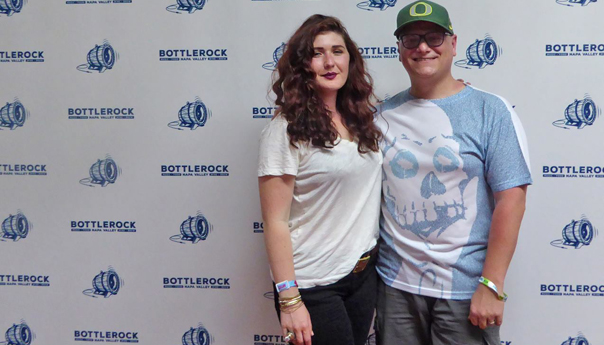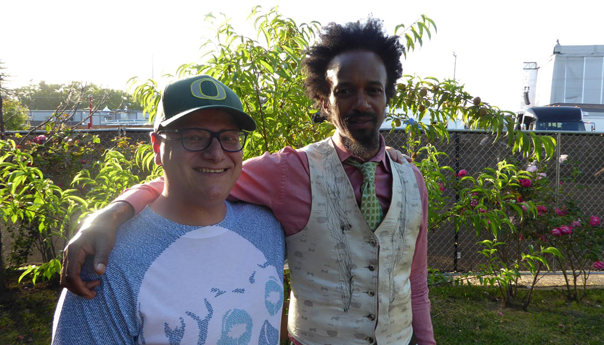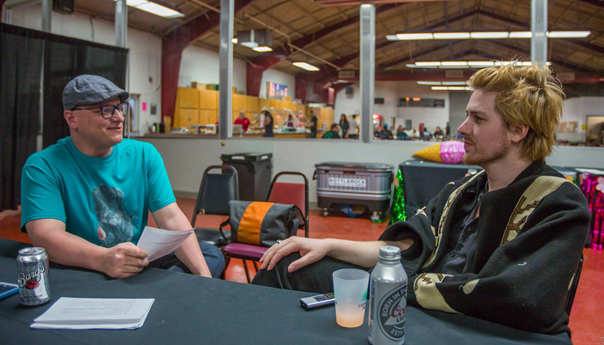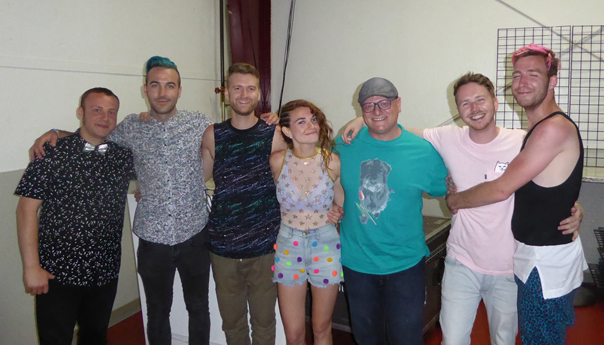Roman Gokhman’s favorite interviews of 2016
Looking back on my interviews over the past 12 months, the first thing that surprised me was just how busy I stayed: nearly 50 interviews of 10 minutes or longer, about a dozen more than 2015, which had seemed much busier.
Interviewing artists is just one part of a music journalist’s job. There’s also the preparation and research, staying abreast of all news, everywhere, going to shows, and, of course, the writing. Writing isn’t always fun, especially when you’re writing on deadline at 2 a.m., but interviews always are. Here are some of my favorites from this year. This list isn’t weighted by “most quotable.” Instead, it matters to me whether the artist is engaged and not just going through the motions. I read everything by everyone, so I know when I get the same soundbite as five others before me. I learned interesting things from each of my interviews (I also learned that I need to buy some different shirts), but these were the ones I’ll remember best.
Below, you can also listen to a playlist of all the artists I interviewed this year.
In January, I interviewed St. Lucia frontman Jean-Philip Grobler mere hours before his band’s sophomore album, Matter, was set to be released. I could hear his wife and bandmate, Patti Beranek, manning business calls in the background at their New York apartment, and at one point she joined our call. Grobler was anxious, but considerate, answering all my questions from the musical to the absurd (Is the cat on your album cover real? Yes. What about the dog? No). And later, he was willing to answer a few follow-up questions between an album release show and a Saturday Night Live appearance. It wasn’t the first time we’ve spoken, so that could have helped. I spoke to him a couple more times in 2016, and I met up with the whole band after a show San Francisco. It was a getaway night for the band. There was no aftershow party scheduled, but they still invited me and a friend to spend about an hour talking about musical influences and childhoods. That’s time they could have been using to get on the road.
This year ignited my belief that country music could carry the torch of rock, led by newer outside-of-mainstream artists like Sturgill Simpson and Margo Price. I never did get to speak to the Grammy-nominated Simpson despite nine months of trying, but Price obliged a couple of my requests. I usually start interviews with a few softballs before digging deeper into an artist’s backstory, but it wasn’t long before Price was talking about the real events that inspired her heart-wrenching songs. And she didn’t flinch or try to evade my questions. Price’s fame has grown dramatically in 2016, but I could tell it didn’t change her at all. More than half a year later, when she’d finally brought her tour to San Francisco, she knew who I was and wanted to chat more.
Aubrie Sellers was another Nashville singer-songwriter that intrigued me in 2016, and I spoke to her for a couple of stories; one a more standard profile and the other about the reemergence of independent country. Sellers, the daughter of Lee Ann Womack, could have changed who she was and probably gone the mainstream country route. Instead, she kept her songs intact and released them the way she wanted on an indie rock label. And for it, some mainstream country music critics dismissed her album as “too rock” or “too blues.” She talked not only about her experiences, but that of her mother’s mainstream experience, which left a bitter taste in her mouth.
When I interviewed Patrick Wimberly and Caroline Polacheck of Chairlift in March, the duo was at South by Southwest, in an Austin rental house, cooking breakfast, and rather than rush me so the two could eat, the morning after a late night, they brought me into the experience. Polacheck ran me through the recipe, even. Wimberly, meanwhile, was happy to talk football. He roots for the Tennessee Titans. I root for their quarterback, Oregon alumnus Marcus Mariota. A week later, at their San Francisco show, my name was mysteriously absent from the band’s guest list. Fortunately, Wimberly was arriving just then and took care of that problem. The duo announced their break-up shortly after this writing. I’m sad, but feel fortunate to have talked to them at what I consider their creative peak.
BottleRock Napa Valley makes more musicians accessible than any other area festival, and I had four of my favorites interview in Napa this year, whether in the artist village, press compound or even one band’s sweltering van that had me wanting to run rather than ask questions. Morgan Kibby (White Sea) had just come off stage before we spoke, and she was visibly juiced from the experience, which inspired me as a result. Talking to her about her time in M83, and her exit, spoke mountains to her creative desires and maturity as an artist and person. I learned that Xavier Dphrepaulezz (Fantastic Negrito) is even more animated and electric off-stage than he is on it. Our conversation was anything but politically correct, but he cared more about speaking his mind than putting on airs, and I respect that. Our conversation was his last for the day, and he said that gave him more freedom to let loose.
With Jamie N Commons, editor Nick DeCicco and I learned that despite the earnestness of his music, the man has a serious sense of humor and talents outside of music. He could be a voice actor, for one. Also, he’s not above being seen in public with journalists, and spent the good part of the following hour catching some other sets with Nick. And my buds in MisterWives first went out of their way to make an interview with me possible, and then poked some fun at me. I’d left my recorder on afterward, and two days later discovered some personal messages from the band. Mandy Lee, I won’t forget that you owe me a pair of jean shorts with colorful cotton balls the next time you’re in town.
My conversation with Biffy Clyro frontman Simon Neil was my first of several that focused, at times, on the messed-up state of the world and the U.S. It was July, and the Brexit vote had just taken place a few days earlier. Neil, a Scott, was none too pleased about the results or the comments by Donald Trump made in his country. More than anything, he wanted me to pass on the warning that even the scarily impossible was possible. The darker themes would reemerge in later conversations with Chuck D of Public Enemy and Prophets of Rage and Poliça singer-songwriter Channy Leaneagh, who both spoke of repressive regimes, police states and the Black Lives Matter movement, and where it connected with police brutality and brutality against police. Both were hopeful, both were doubtful and both inspiring. These were people who wouldn’t go down without a fight. Chuck, who I had spoken to previously, was ever-questioning. He doesn’t just spout his thoughts. He also wants to know yours.
If it’s possible to be both underappreciated and overexposed, the honor belongs to Kamasi Washington, the critically acclaimed jazz empresario whose genre stuck him first on the Outside Lands Sunday lineup. Washington doesn’t sing, but prior to his steller performance, he showed an extremely smart and thoughtful side in a 45-minute-long conversation about his contributions to jazz and hip hop, his work with Kendrick Lamar and others, his childhood and the hefty expecations now sitting on his shoulders. His deep-rooted intensity is not visible from far away, but it’s obvious in his eyes. Washington has even greater art to make.
Also in August, I interviewed a Welsh singer-songwriter with only a handful of songs to her name, and no shows in the U.S. in the near fature. But Betsy (who didn’t tell me her last name) also had big dreams, for pop music, and growing beyond her modest farm girl upbringing. She wants to be iconic, like Madonna or Lady Gaga, and is ready to give it her best shot. Also, she promised to make me a home-cooked Welsh meal the first time she comes to the Bay Area. I can’t wait!
Twice within a month I interviewed Greta Morgan of Springtime Carnivore. Morgan had experienced some mainstream success with The Hush Sound, but I discovered her in 2008 or so with her second band, Gold Motel. Springtime Carnivore is her third project, and her solo music has been critically acclaimed (I agree). The first time we spoke it was by phone. She was housesitting for a friend in L.A. and speaking to me while making breakfast. I enjoyed learning how she made her most-recent album, as well as a covers album with her best friend, Katy Goodman of La Sera. The second interview was in person in San Francisco before her show with La Sera. What I’ll remember best about that interview, which we filmed, was that after getting set up in front of the beautifully lit stage, Greta accidentally forgot about the chat and had to rush in from a dinner with friends. By then, doors had opened and video editor Lorenz Angelo and I were forced to scamper to the dark, cavernous greenroom at the Swedish-American Hall. Nearly an hour of lighting and sound tests were thrown out the window, and we could not dampen the echoes inside the new location. In order to get the best possible shot while having Goodman and Morgan have a conversation with me, I had to balance on one leg beside a bright light. I think you can see the anxiety in the photo, taken afterward.
In the three sisters of the band Joseph, I found my kind of people. Maybe it was our shared Oregon upbringing, but I’m not convinced it’s just that. Natalie, Meegan and Allison Closner own the try, try again philosophy. Natalie was a solo singer but got burnt out by the effort. Rather than giving up, she convinced her younger sisters to make music with her, with a sometimes blind faith that they could make magic together. She was right. They were right for each other.
One of my final interviews of 2016 was with former Black Crowes frontman Chris Robinson, which came with little notice. Robinson, who has been fronting the Chris Robinson Brotherhood for several years, had three shows coming up at the Fillmore the very next week, and I had to hurry to make it happen. I had a day to prepare, and beforehand, my questions didn’t impress me too much. But once the conversation began, it began to veer on all sorts of tangents. Part of that was Robinson’s personality. He’s a natural storyteller, with more stories than time on his hands. But I believe he was also more open than usual about his hobbies and his childhood; particularly his relationship with his father. I cut about 4,500 words in half and ended up with a story that felt right, but I never expected it to be one of RIFF’s best-read pieces of the year.
Follow Roman Gokhman at Twitter.com/RomiTheWriter and RomiTheWriter.Tumblr.com.










